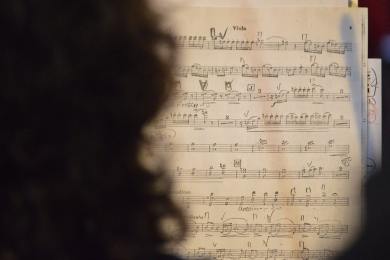Music aficionados have probably experienced a music theory class at some point in their life. However, whether you have taken a class or not, you may be wondering if this traditional way of studying music still matters and is worth the effort to learn.
Music theory still matters and is worthwhile to learn because it provides a strong foundation in musical concepts. Musicians can take this knowledge and apply it to their music to make it technically more proficient.
However, musicians should take care not to get overwhelmed with theory and to retain their creativity.
In a world that places emphasis on modernization and musical revolutions, it might be surprising to learn that music theory can still help you. Keep reading to learn more about why you should consider studying at least some musical theory.
Why Musical Theory Matters
Musical theory is the study of how music works. That is to say, a student in music theory will learn about the foundational components of music, such as the following:
- Terminology to describe music
- The technical aspects of music, such as chords and harmonies
- Methodology to create music
Throughout history, music theory has been given great weight as the way to create “correct” music. Renowned composers, such as Beethoven, are hailed by musical theorists for their innovation with the technical side of music.
Criticisms of Musical Theory
In recent years, music theory has begun to attract many criticisms. These include the following:
- Distraction: Musical purists will say that getting bogged down in music theory distracts from the true enjoyment of music. After all, nobody starts out loving music because they admire a chord progression or particularly technical achievement. People love music, and getting lost in theory can distract from that.
- Inaccessibility: Defining “good” music in terms of musical theory can isolate truly talented musicians who have lacked the resources or background to learn about musical theory. Some people argue that defining music in theoretical terms is inherently elitist.
- Over-complication: When too much debate is given to music theory, it can result in overcomplicated discussions that may lose the true essence of the song.
- Limitations for creativity: Similarly, when people get lost in music theory, they may find that their creativity is lost in trying to make a song technically perfect. This is something that can be extremely limiting for aspiring musicians and songwriters.
These arguments are certainly valid and show that music theory can be a disadvantageous thing if taken too far. Despite this, it still has clear benefits for every musician which will be discussed in the following section.
Why it’s Worth it to Learn Music Theory
You do not need to be an expert, but if you are a musician or music fan, it will help you to have a foundation in musical theory. Here’s why:
- Communication: Having a conversation with bandmates or other musicians will be that much easier if there is a common language to describe what you want to do.
- Appreciation: Sometimes we know musicians are incredible, but we do not know exactly why. Music theory will give you the vocabulary and the knowledge base that you need to identify exactly what your favorite musicians are doing.
- Marketability: If you are hoping to make a career in the music industry as a teacher, producer, or some other type of professional, knowing music theory will help demonstrate clearly to employers that you are a well-rounded and knowledgeable musician.
- Creating music: Last but perhaps most importantly, knowing the foundations of music can help you make your own. It can make it easier for you to decide what a certain song needs and how you can integrate the music skills you most admire into your own work.
There is no perfect amount of music theory to know, but you will need to strike a balance between being educated and losing your creativity.
It is a good idea to take a course or read some books on the subject, but if you find you are getting overwhelmed and confused this can be a sure sign that it’s time to return to music without too much theoretical backdrop.
Conclusion
Music is one of the most creative and dynamic fields, but it does have an undeniable technical backdrop as well. Studying music theory will allow new and experienced musicians to better inform their playing and become more educated in the techniques behind incredible music.
That being said, you should keep your creativity and love for music at the heart of your music theory study. Finding a balance between the two is necessary to thrive as a musician.




1 thought on “Does Music Theory Still Matter and is it Worth Learning?”
Comments are closed.